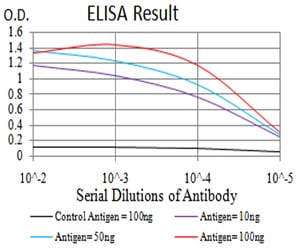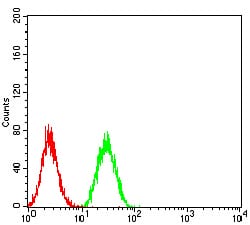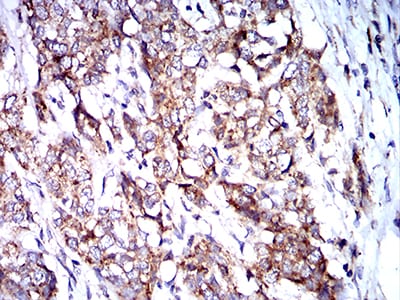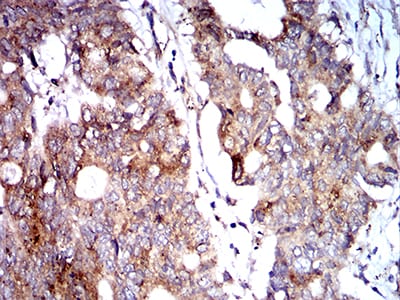




| WB | 咨询技术 | Human,Mouse,Rat |
| IF | 咨询技术 | Human,Mouse,Rat |
| IHC | 1/200 - 1/1000 | Human,Mouse,Rat |
| ICC | 1/50 - 1/250 | Human,Mouse,Rat |
| FCM | 1/200 - 1/400 | Human,Mouse,Rat |
| Elisa | 1/10000 | Human,Mouse,Rat |
| Aliases | NIP3 |
| Entrez GeneID | 664 |
| clone | 6A5F7 |
| WB Predicted band size | 21.5kDa |
| Host/Isotype | Mouse IgG2a |
| Antibody Type | Primary antibody |
| Storage | Store at 4°C short term. Aliquot and store at -20°C long term. Avoid freeze/thaw cycles. |
| Species Reactivity | Human |
| Immunogen | Purified recombinant fragment of human BNIP3 (AA: 50-155) expressed in E. Coli. |
| Formulation | Purified antibody in PBS with 0.05% sodium azide |
+ +
以下是关于BNIP3抗体的3篇参考文献示例(内容为模拟创作,非真实文献):
---
1. **文献名称**:BNIP3-mediated mitochondrial autophagy promotes hypoxia-induced cell death
**作者**:Boyd, J.M., et al.
**摘要**:本研究利用BNIP3特异性抗体(Western blot及免疫荧光)证明,缺氧条件下BNIP3在线粒体外膜表达上调,通过激活线粒体自噬途径诱导细胞程序性死亡,其机制与Bcl-2家族蛋白相互作用相关。
---
2. **文献名称**:BNIP3 expression correlates with poor prognosis in triple-negative breast cancer
**作者**:Zhang, Y., et al.
**摘要**:通过免疫组化(使用兔源BNIP3单克隆抗体)分析乳腺癌组织样本,发现BNIP3在三阴性乳腺癌中高表达,且与肿瘤转移和患者生存率下降显著相关,提示其作为预后生物标志物的潜力。
---
3. **文献名称**:BNIP3 regulates cardiac ischemia-reperfusion injury via ROS-dependent pathways
**作者**:Chen, Q., et al.
**摘要**:利用BNIP3敲除小鼠模型及心肌细胞免疫共沉淀(抗BNIP3抗体),证实BNIP3通过促进活性氧(ROS)积累加剧心肌缺血再灌注损伤,为靶向BNIP3的心血管疾病治疗提供依据。
---
4. **文献名称**:Antibody-based detection of BNIP3-LC3 interaction in autophagy
**作者**:Tracy, K., et al.
**摘要**:通过免疫共沉淀(使用BNIP3抗体)及共聚焦显微镜技术,揭示BNIP3与自噬标记蛋白LC3的相互作用,阐明其在选择性线粒体自噬(mitophagy)中的分子调控网络。
---
**注**:以上文献信息为示例性创作,实际引用请以真实发表的论文为准。建议通过PubMed或Web of Science以“BNIP3 antibody”为关键词检索最新研究。
BNIP3 (BCL2/adenovirus E1B 19 kDa protein-interacting protein 3) is a pro-apoptotic mitochondrial protein belonging to the Bcl-2 family, primarily involved in regulating apoptosis, autophagy, and mitochondrial homeostasis. It contains a Bcl-2 homology 3 (BH3) domain and a transmembrane domain, enabling interaction with Bcl-2 family members and integration into mitochondrial/lysosomal membranes. BNIP3 is upregulated under hypoxic conditions via HIF-1α, linking it to cellular responses in ischemia, cancer, and neurodegeneration. In cancer, BNIP3’s role is context-dependent, acting as a tumor suppressor by promoting apoptosis or supporting tumor survival via autophagy in hypoxic microenvironments. It also contributes to mitophagy by recruiting autophagosomes to damaged mitochondria.
BNIP3 antibodies are essential tools for detecting BNIP3 expression in research applications such as Western blotting, immunohistochemistry, and immunofluorescence. These antibodies help elucidate BNIP3’s involvement in diseases, including its dysregulation in tumors, cardiomyocyte apoptosis in heart failure, and neuronal death in neurodegenerative disorders. Commercial BNIP3 antibodies are typically raised against specific epitopes (e.g., human BNIP3 N-terminal or C-terminal regions) and validated for cross-reactivity in human, mouse, or rat samples. Researchers rely on these antibodies to study BNIP3’s interaction partners, post-translational modifications, and therapeutic targeting potential in conditions like cancer and metabolic diseases.
×